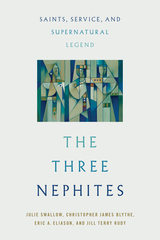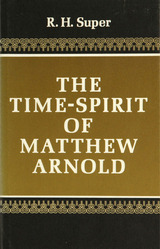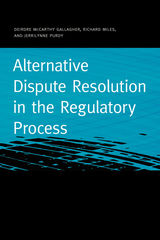
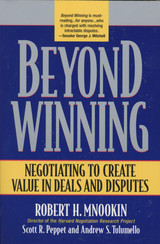
Conflict is inevitable, in both deals and disputes. Yet when clients call in the lawyers to haggle over who gets how much of the pie, traditional hard-bargaining tactics can lead to ruin. Too often, deals blow up, cases don’t settle, relationships fall apart, justice is delayed. Beyond Winning charts a way out of our current crisis of confidence in the legal system. It offers a fresh look at negotiation, aimed at helping lawyers turn disputes into deals, and deals into better deals, through practical, tough-minded problem-solving techniques.
In this step-by-step guide to conflict resolution, the authors describe the many obstacles that can derail a legal negotiation, both behind the bargaining table with one’s own client and across the table with the other side. They offer clear, candid advice about ways lawyers can search for beneficial trades, enlarge the scope of interests, improve communication, minimize transaction costs, and leave both sides better off than before. But lawyers cannot do the job alone. People who hire lawyers must help change the game from conflict to collaboration. The entrepreneur structuring a joint venture, the plaintiff embroiled in a civil suit, the CEO negotiating an employment contract, the real estate developer concerned with environmental hazards, the parent considering a custody battle—clients who understand the pressures and incentives a lawyer faces can work more effectively within the legal system to promote their own best interests. Attorneys exhausted by the trench warfare of cases that drag on for years will find here a positive, proven approach to revitalizing their profession.

The Getting to Yes Guide for ESL Students and Professionals prepares non-native speakers of English to join the global community of people who use Getting to Yes to negotiate win-win agreements in English. It provides page-by-page explanations of over 1,000 words, phrases, concepts, and examples that these readers may misunderstand; short stories that use these new words and concepts to help readers apply them to new contexts; delightful cartoons to highlight main ideas; optional ESL activities; and a glossary of the key negotiation idioms and terms used in Getting to Yes. In this guide, author Barrie J. Roberts applies her experience as a public interest attorney, court Alternative Dispute Resolution administrator, ESL instructor, and court interpreter trainer to help readers improve their professional-level English along with their negotiation skills.
Benefits for teachers:
- Each Chapter Guide provides a ready-made lesson plan with activities to do before, while, and after reading each chapter of Getting to Yes
- The book can be used as a recommended self-study reference
- This book can be used for selected chapters of Getting to Yes or for a complete standalone course on Getting to Yes for non-native speakers of English or Generation 1.5 students
- Optional activities throughout the book can be assigned for in or out of the classroom. These include activities for reading comprehension, vocabulary building, paraphrasing, critical thinking, discussing, and writing
- Short stories written to accompany each chapter require students to apply new vocabulary and negotiation concepts to real-world disputes
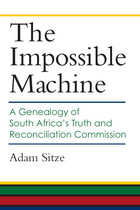
Adam Sitze meticulously traces the origins of South Africa’s Truth and Reconciliation Commission back to two well-established instruments of colonial and imperial governance: the jurisprudence of indemnity and the commission of inquiry. This genealogy provides a fresh, though counterintuitive, understanding of the TRC’s legal, political, and cultural importance. The TRC’s genius, Sitze contends, is not the substitution of “forgiving” restorative justice for “strict” legal justice but rather the innovative adaptation of colonial law, sovereignty, and government. However, this approach also contains a potential liability: if the TRC’s origins are forgotten, the very enterprise intended to overturn the jurisprudence of colonial rule may perpetuate it. In sum, Sitze proposes a provocative new means by which South Africa’s Truth and Reconciliation Commission should be understood and evaluated.

In December 2005, South Africa’s National Prosecuting Authority (NPA) promulgated a controversial policy on the prosecution of apartheid-era crimes, sparking renewed debate about such prosecutions and their role in the transition to democracy since 1994. The book presents a diverse collection of perspectives on prosecutions in South Africa, including a foreword by playwright and actor John Kani. Other reflections from former Truth and Reconciliation Commission (TRC) commissioners, survivors of apartheid, civil society members, and government officials outline the serious questions facing South Africa as it deals with prosecutions today.
The book traces the history of the prosecutions in South Africa including their relationship to the TRC and a recent legal challenge that asserts the NPA policy is an unconstitutional re-run of the TRC amnesty process. Throughout, the book highlights the important themes related to any post-conflict prosecution scheme including rule-of-law concerns, questions of evenhandedness and moral relativism, competing priorities and resource allocation, the limits of a court-centered approach to justice, and the potential transformative power of prosecutions.
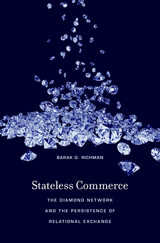
In Stateless Commerce, Barak Richman uses the colorful case study of the diamond industry to explore how ethnic trading networks operate and why they persist in the twenty-first century. How, for example, does the 47th Street diamond district in midtown Manhattan—surrounded by skyscrapers and sophisticated financial institutions—continue to thrive as an ethnic marketplace that operates like a traditional bazaar? Conventional models of economic and technological progress suggest that such primitive commercial networks would be displaced by new trading paradigms, yet in the heart of New York City the old world persists. Richman’s explanation is deceptively simple. Far from being an anachronism, 47th Street’s ethnic enclave is an adaptive response to the unique pressures of the diamond industry.
Ethnic trading networks survive because they better fulfill many functions usually performed by state institutions. While the modern world rests heavily on lawyers, courts, and state coercion, ethnic merchants regularly sell goods and services by relying solely on familiarity, trust, and community enforcement—what economists call “relational exchange.” These commercial networks insulate themselves from the outside world because the outside world cannot provide those assurances.
Extending the framework of transactional cost and organizational economics, Stateless Commerce draws on rare insider interviews to explain why personal exchange succeeds, even as most global trade succumbs to the forces of modernization, and what it reveals about the limitations of the modern state in governing the economy.
READERS
Browse our collection.
PUBLISHERS
See BiblioVault's publisher services.
STUDENT SERVICES
Files for college accessibility offices.
UChicago Accessibility Resources
home | accessibility | search | about | contact us
BiblioVault ® 2001 - 2025
The University of Chicago Press


